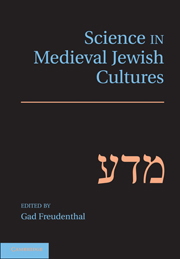Book contents
- Frontmatter
- Contents
- Contributors
- Preface and Acknowledgments
- Introduction: The History of Science in Medieval Jewish Cultures
- Part I The Greek-Arabic Scientific Tradition and Its Appropriation, Adaptation, and Development in Medieval Jewish Cultures, East and West
- 1 The Assimilation of Greco-Arabic Learning by Medieval Jewish Cultures
- 2 Medieval Hebrew Translations of Philosophical and Scientific Texts
- 3 Arabic and Latin Cultures as Resources for the Hebrew Translation Movement
- 4 The Production of Hebrew Scientific Books According to Dated Medieval Manuscripts
- Part II Individual Sciences as Studied and Practiced by Medieval Jews
- Part III Scientific Knowledge in Context
- Name Index*
- Subject Index*
- References
1 - The Assimilation of Greco-Arabic Learning by Medieval Jewish Cultures
A Brief Bibliographic Introduction
from Part I - The Greek-Arabic Scientific Tradition and Its Appropriation, Adaptation, and Development in Medieval Jewish Cultures, East and West
Published online by Cambridge University Press: 05 June 2012
- Frontmatter
- Contents
- Contributors
- Preface and Acknowledgments
- Introduction: The History of Science in Medieval Jewish Cultures
- Part I The Greek-Arabic Scientific Tradition and Its Appropriation, Adaptation, and Development in Medieval Jewish Cultures, East and West
- 1 The Assimilation of Greco-Arabic Learning by Medieval Jewish Cultures
- 2 Medieval Hebrew Translations of Philosophical and Scientific Texts
- 3 Arabic and Latin Cultures as Resources for the Hebrew Translation Movement
- 4 The Production of Hebrew Scientific Books According to Dated Medieval Manuscripts
- Part II Individual Sciences as Studied and Practiced by Medieval Jews
- Part III Scientific Knowledge in Context
- Name Index*
- Subject Index*
- References
Summary
“The Jewish people did not begin to philosophize because of an irresistible urge to do so. They received philosophy from outside sources, and the history of Jewish philosophy is a history of successive absorptions of foreign ideas which were then transformed and adapted to specific Jewish points of view.” Julius Guttmann's pertinent assessment applies to all the domains considered in this volume. Consequently, one could reasonably expect a volume entitled Science in Medieval Jewish Cultures to offer full descriptions of the bodies of knowledge that Jews appropriated during the Middle Ages, as well as detailed accounts of the process of appropriation itself. However, no attempt at such a comprehensive treatment is undertaken here, although many of the chapters that follow describe the assimilation of Greco-Arabic science in the specific domain addressed. The reason for this omission is that a number of thorough studies bearing on this multifold subject are available, and some are very recent, making yet another effort redundant. Hence it seems sufficient to offer here a short guide to the literature that will steer neophyte readers to relevant studies.
The assimilation of science and philosophy by medieval Jews in the Islamic world and by those in Christian Europe should be studied separately. The Arabophone Jews in the Islamic world had direct access to the many sources available in Arabic; in contrast, Jewish scholars living in Christian Europe as a rule did not read Latin, the educated language of the majority culture, and had access only to literature available in Hebrew. Consequently, “the history of successive absorptions” of foreign scientific and philosophical lore by medieval Jews must be addressed separately for these two cultural areas.
- Type
- Chapter
- Information
- Science in Medieval Jewish Cultures , pp. 13 - 16Publisher: Cambridge University PressPrint publication year: 2012



